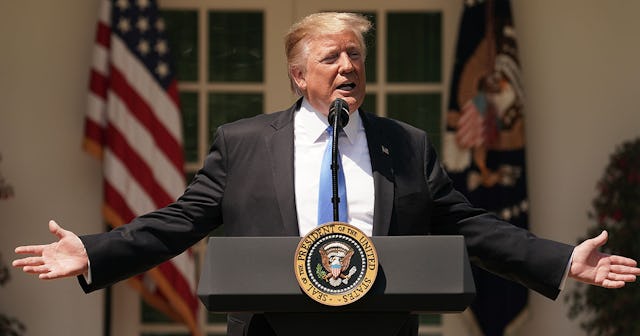New Trump Rule Protects Health Care Workers Who Refuse Abortions

The new rule will give health care workers freedom to refuse care to patients based on their religious beliefs
President Trump used today, the National Day of Prayer, to announce a new policy that will protect health care providers, insurers, and employers who don’t want to be part of procedures like abortion, sterilization, or assisted suicide because they violate their religious beliefs. The leeway will be given for anyone involved in procedures they have a religious or conscientious objection to, and it was issued by the Department of Health and Human Services today.
Louise Melling, deputy legal director at the American Civil Liberties Union, explains why the rule is completely unjust — and dangerous. “Religious liberty is a fundamental right, but it doesn’t include the right to discriminate or harm others,” she said. “This rule threatens to prevent people from accessing critical medical care and may endanger people’s lives. … Medical standards, not religious belief, should guide medical care.”
However, the ruling is seen as a huge victory for conservatives and the religious right. Roger Severino, director of HHS’s Office for Civil Rights, sees it as a necessary protection for employees and companies with conscientious objections to certain procedures. “This rule ensures that healthcare entities and professionals won’t be bullied out of the health care field because they decline to participate in actions that violate their conscience, including the taking of human life,” he says. “Protecting conscience and religious freedom not only fosters greater diversity in healthcare, it’s the law.”
Severino isn’t messing around when it comes to protecting folks of faith before patients with medical needs. He even created a new Division of Conscience and Religious Freedom. “Never forget that religious freedom is a primary freedom, that it is a civil right that deserves enforcement and respect,” he said at the time.
The OCR’s mission statement was even changed to reflect Severino’s commitment to religious freedom for some over the rights of others. The agency used to promise to “improve the health and well-being of people across the nation” and to ensure equal access to health care services provided by HHS. The new statement makes clear that OCR is also enforcing conscience and religious freedom laws by adding that the office “protects that exercise of religious beliefs and moral convictions by individuals and institutions.”
Fatima Goss Graves, president and CEO of the National Women’s Law Center, points out exactly how far-reaching this protection extends. “This rule allows anyone from a doctor to a receptionist to entities like hospitals and pharmacies to deny a patient critical — and sometimes lifesaving — care,” she said in a statement. This is because, as Melling points out, the ruling gives shield to anyone with an “articulable connection” to the procedure they’re objecting to. “If I am the person who checks you into the hospital, that’s an articulable connection. If I’m the person who would take your blood pressure, that would be an articulable connection,” she says.
That’s pretty broad protection for some people while leaving patients in need of care floundering for someone else who’s willing to help them. However, Jonathan Imbody, VP of government relations at the Christian Medical Association, says the rule “is consistent with decades of federal conscience law,” and that “Education about and enforcement of these laws has long been neglected.”
The group cites several providers who were punished for refusing to perform abortions, or even refer a patient to another provider who would. Their listing includes stories like that of a gynecologist who states her malpractice insurance company wouldn’t cover her if she refused to inseminate a lesbian. They believe this law is fair and will allow religious health care workers to practice their faith and do their jobs.
The fact is, their job means doing what’s right for their patient as defined by medical science, not their innermost beliefs. If I go to a doctor, I’m absolutely not interested in their religion and if they can’t perform the full array of services I might need to be healthy, they have no business being in medicine. The ACLU agrees and is using the same case HHS is citing as a reason for this rule — a case where a woman sued the church after being denied an emergency abortion, at a Catholic hospital that kept sending her home instead. She ended up developing an acute infection after she miscarried the pregnancy.
The ACLU feels this story is an example of why health care providers need to set aside their religious beliefs when it comes to what’s best for their patients. It’s terrifying that the Trump administration is refusing to see how important that is.